-
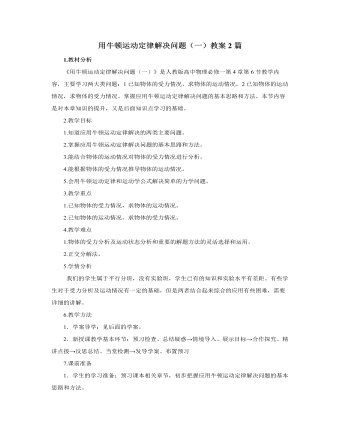
人教版新课标高中物理必修1用牛顿运动定律解决问题(一)教案2篇
(四)实例探究☆力和运动的关系1、一个物体放在光滑水平面上,初速为零,先对物体施加一向东的恒力F,历时1秒,随即把此力改变为向西,大小不变,历时1秒钟,接着又把此力改为向东,大小不变,历时1秒钟,如此反复只改变力的方向,共历时1分钟,在此1分钟内A.物体时而向东运动,时而向西运动,在1分钟末静止于初始位置之东B.物体时而向东运动,时而向西运动,在1分钟末静止于初始位置C.物体时而向东运动,时而向西运动,在1分钟末继续向东运动D.物体一直向东运动,从不向西运动,在1分钟末静止于初始位置之东☆牛顿运动定律的应用2、用30N的水平外力F,拉一静止放在光滑的水平面上质量为20kg的物体,力F作用3秒后消失,则第5秒末物体的速度和加速度分别是A.v=7.5m/s,a=l.5m/s2B.v=4.5m/s,a=l.5m/s2C.v=4.5m/s,a=0D.v=7.5m/s,a=0
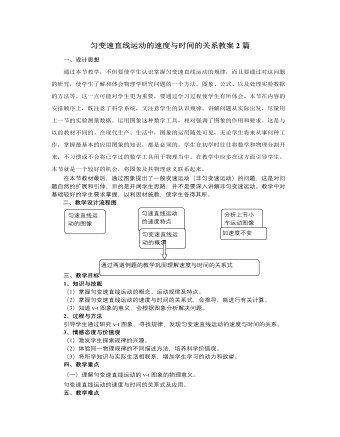
人教版新课标高中物理必修1匀变速直线运动的速度与时间的关系教案2篇
一、设计思想通过本节教学,不但要使学生认识掌握匀变速直线运动的规律,而且要通过对这问题的研究,使学生了解和体会物理学研究问题的一个方法,图象、公式、以及处理实验数据的方法等。这一点可能对学生更为重要,要通过学习过程使学生有所体会。本节在内容的安排顺序上,既注意了科学系统,又注意学生的认识规律。讲解问题从实际出发,尽量用上一节的实验测量数据。运用图象这种数学工具,相对强调了图象的作用和要求。这是与以前教材不同的。在现代生产、生活中,图象的运用随处可见,无论学生将来从事何种工作,掌握最基本的应用图象的知识,都是必须的。学生在初学时往往将数学和物理分割开来,不习惯或不会将已学过的数学工具用于物理当中。在教学中应多在这方面引导学生。本节就是一个较好的机会,将图象及其物理意义联系起来。
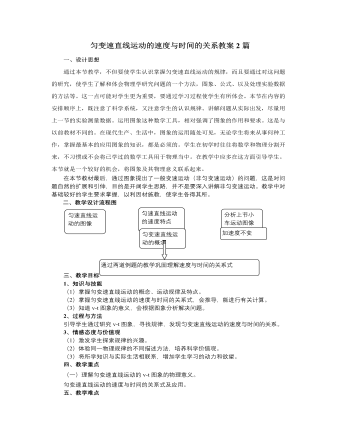
人教版新课标高中物理必修1匀变速直线运动的速度与时间的关系教案2篇
一、设计思想通过本节教学,不但要使学生认识掌握匀变速直线运动的规律,而且要通过对这问题的研究,使学生了解和体会物理学研究问题的一个方法,图象、公式、以及处理实验数据的方法等。这一点可能对学生更为重要,要通过学习过程使学生有所体会。本节在内容的安排顺序上,既注意了科学系统,又注意学生的认识规律。讲解问题从实际出发,尽量用上一节的实验测量数据。运用图象这种数学工具,相对强调了图象的作用和要求。这是与以前教材不同的。在现代生产、生活中,图象的运用随处可见,无论学生将来从事何种工作,掌握最基本的应用图象的知识,都是必须的。学生在初学时往往将数学和物理分割开来,不习惯或不会将已学过的数学工具用于物理当中。在教学中应多在这方面引导学生。本节就是一个较好的机会,将图象及其物理意义联系起来。
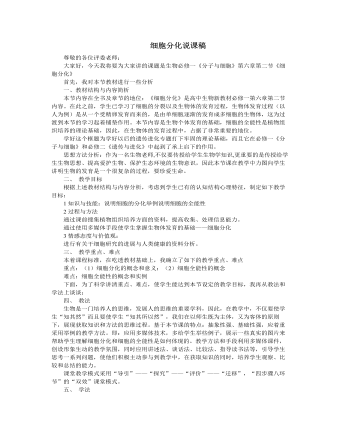
人教版高中生物必修1细胞分化说课稿
在讲述细胞分化的意义时,也可以用实例来解决,工厂的生产车间里不同的工人干着不同的工作,一件产品的产出需要这些工人才能创造出来,一个生物体就像一个车间一样,不同的细胞各司其职,相互合作。工人的分工是主管调解出来的,而不同细胞的出现就是细胞分化的结果,所以说,细胞的分化是生物体发育的基础。在讲到细胞全能性的时候,要多给学生举些关于细胞全能性的例子,如植物组织培养、克隆技术等等,让学生从实际的例子中真正的悟出细胞全能性的含义。此外,还要重视教材中的疑问,适当对题目进行引申,使它的作用更加突出,有利于学生对知识的串联、积累、加工,从而达到举一反三的效果。怎样来解释细胞的全能性呢?这主要以讲授法来解释了,细胞全能性的体现需要在组织或器官离体后才能体现出来,每个细胞都包含着生物体的全套遗传基因,通过基因选择性的表达,使离体的组织或器官通过分裂和分化逐渐发育成完整的植株。

人教版高中历史必修3宋明理学说课稿3篇
陆王心学与程朱理学相比有何异同?生 不同点:在理的内涵上不同,程朱理学认为“理”是贯通于宇宙、人伦的客观存在,是一种普遍的规律准则;陆王心学认为心即理,是“良知”,认为人心便是世界万物的本原。方法上也有不同:前者向外追究,“格物致知”;后者向内探求,“发明本心”以求理,克服私欲、回复良知。生 相同点:都提出了一个宇宙、社会、人生遵循的“理”。师 对。程朱理学是客观唯心主义,阳明心学是主观唯心主义。这两者的分歧是理学范围内的分歧,其基本思想是一致的。师 宋明理学与汉唐以前的儒学比较,最大的特点在于批判地吸收了佛教哲学的思辨结构和道教的宇宙生成论,将儒家的伦理学说概括升华为哲学基本问题。其实质是把佛、道“养性”“修身”引向儒家的“齐家”“治国”“平天下”,对儒家的纲常道德给予哲学论证,使之神圣化、绝对化、普遍化,以便深入人心,做到人人遵而行之。
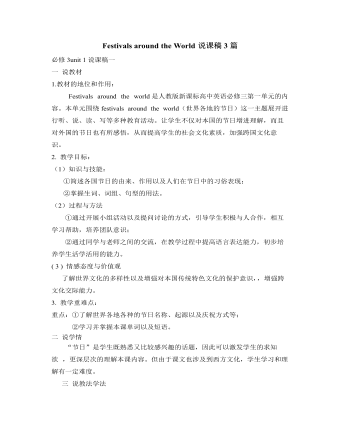
人教版高中英语必修3Festivals around the World说课稿3篇
Teaching plan for Unit 1 book3Good morning, teachers. It’s my great pleasure to be here because I can share my lesson with you and I can learn a lot from it. I’ll begin my lesson from the following four parts, the teaching material, the teaching methods, the studying methods and the teaching procedure.Firstly, let me talk about the teaching material. The content of my lesson is the reading passage festivals and celebrations of Unit 1 Festivals around the world. This passage is about festivals and celebrations. By studying this passage, we’ll enable the students to know that festivals exit everywhere, and many of festivals in different countries celebrate similar ideas. As we all know, the reading passage is the center of each unit. If the Ss can learn it well, it will be helpful to make the Ss learn the rest of this unit.After studying the teaching material, I think the teaching aims are as the followings:1. Knowledge aims:(1) The Ss can master the usage of the important words andexpressions.(2)The Ss can use the __________________ (grammar) in the proper situation.Make students know about the festivals all over the world and the detail of the festivals, such as origin, content, and the date of the holiday festivals.2. Ability aims:(1) Students can talk about festivals and celebrations in English(2) To improve the student’s reading ability, especially their skimming and scanning ability.3. Emotion aims:Make the Ss know about the foreign festivals, and respect other countries’ custom.Next, let’s come to the important points and the difficult points.The important point is how to make the Ss understand the text better and the difficult point is how can they talk about it. secondly, Teaching Methods:1. task-based Language Teaching2. Computer assisted language teaching.3. question-and–answer methodThirdly, Studying Methods:
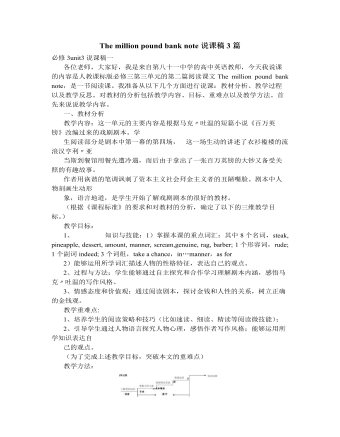
人教版高中英语必修3The million pound bank note说课稿3篇
在接下来的细读环节,我套用了高考对阅读理解的考查方式设置了5个问题,分别为三个推理判断题,一个细节题和一个主旨大意题。学生需要对文章的内容进行分析、归纳、推理、猜测等高级思维活动才能做出正确的回答。【设计意图】这一过程是对学生进行细读的训练,培养学生获取特定信息和挖掘文章深层次信息的能力。第三环节:Intensive-reading (精读) 15′第三个环节精读,既是最重要的环节,也是突破本课重难点的关键。首先,让学生思考剧本中人物看到百万英镑前后的态度发生了怎样的变化。其次,让学生仔细阅读文章,找出可以表现人物态度变化的具体的语言和动作。最后,让学生总结人物的态度发生变化的根本原因是什么,从而引出Money Talks, 供学生思考。【设计意图】通过一系列的活动培养学生学习从人物的语言和动作探究人物的心理,使学生进一步体会戏剧语言的魅力,从而对文章背后所反映的社会问题进行思考,也为下一步的讨论环节做好铺垫。
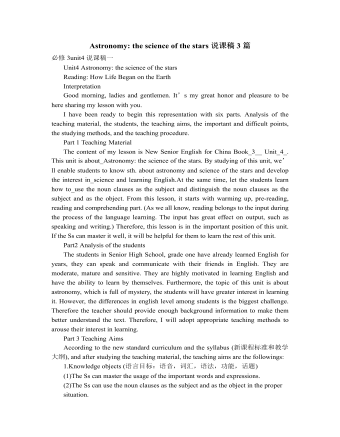
人教版高中英语必修3Astronomy the science of the stars说课稿3篇
Step 2 Pre-listeningAfter students finish their discussion, I will show a picture of Newton and ask them: Who is him? What is he famous for? Could you find out some words to describe him? Maybe students will answer that he is genius for his finding of theGravitation, making a great contribution to the progress of human being. At that time I will show another two pictures of Einstein and Hawking, letting students guess who they are and write down their idea about the Gravitation. For I have arranged them to search more information about the gravity before this class, Students have beenfamiliar with the topic and will not be afraid about this abstract conception, which is helpful for their listening.Step 3 While-listeningIn this step, students will be required to listen the material for three times. The first and listening is extensive listening and the second and third listening is intensive listening. In the first time, They are required to listen a material including Part 1 and Part 2 and choose the best summary of the listening text. After they choose the right answer, They also need work in group to explain what is wrong with the others. Then I will make a conclusion that we should pay attention to the first paragraph and last paragraph and some keys to get the main idea. By doing this, their capacity of generalization will have a great improvement.Before the second listening, I will ask students to scan the blank on the power point quickly and ask them to note down some key words .Then ask them to listen to the Part 1again and fill the first column of the chart. Maybe some students just show the ideas of these three scientists an still can’t catch their development of gravity. Therefore, I will ask them to listen to Part 2 again and fill in the rest. After finish the listening, I will give them ten minutes to discuss with their partner. I will also guidethem to improve their answers when they discuss with others.
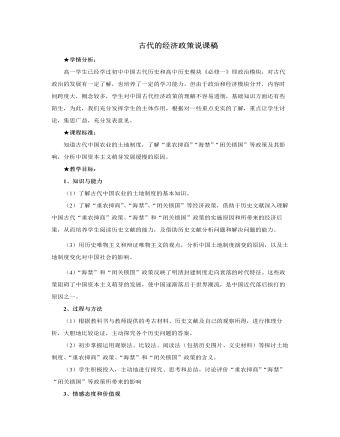
人教版高中历史必修2古代的经济政策说课稿
3、清代的“闭关锁国”政策:(1)原因:①根本原因:自给自足的封建自然经济;②客观原因:西方殖民者向东方殖民扩张;③直接原因:对付东南沿海人民的抗清斗争(2)内容:严格限制对外贸易。但并不是禁绝海外贸易。康熙晚期,禁止商人前往南洋贸易;乾隆时只开广州一处通商,并设立政府特许的贸易机构广州“十三行”统一经营管理对外贸易。(3)后果:①闭关锁国政策妨碍了海外市场的开拓,抑制了资本的原始积累,从而阻碍了资本主义萌芽的发展。②闭关锁国政策隔绝了中国与外界的联系,从而阻断了中国学习西方的先进科学技术,阻碍了生产力发展,使中国落后于世界潮流。③“闭关锁国”政策在一定程度上也保护了国家的安全。教师可以设置问题:17-18世纪中国显露出哪些危机?

人教版高中生物必修2人类遗传病说课稿
一、人类遗传病1.概念2.分类(1)单基因遗传病(2)多基因遗传病(3)染色体异常遗传病①原因②类型3遗传病的特点4.遗传病对人类的危害八、说布置作业在作业的布置中,我严格遵循“重质量、轻负担”的指导思想。第一题主要是为了帮助学生及时纠正原有的对知识的错误理解或片面认识,培养学生的解题技巧和技能。所以我选用了该题。同时想借助该题培养学生对问题的科学的思维方法和探究的精神。帮助学生提高对信息技术运用的熟练程度,发展学生的信息素养。附作业:1、连线题,请同学们连线指出下列遗传各属于何种类型?(1)苯丙酮尿病 A、单基因遗传病(2)21三体综合征(3)抗维生素D佝偻病 B、多基因遗传病(4)软骨发育不全(5)青少年型糖尿病 C、常染色体病2、以生物小组为单位进行人类遗传病的调查。
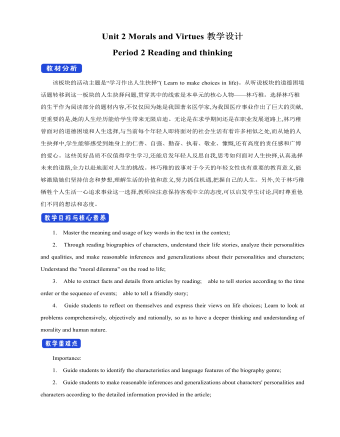
新人教版高中英语必修3Unit 2 Morals and Virtues教学设计二
Activity 41. Students complete the task of activity 4, then teachers and students check the answers. 2. The teacher organized the students to work together and asked them to use the tables and mind maps sorted out before to retold the important choices in Lin Qiaozhi's life and their resultsStep 5 Language points1. The teacher asks the students to read the text carefully, find out the core words and long and difficult sentences in the text and draw lines, understand the use of vocabulary, and analyze the structure of long and difficult sentences. 2. The teacher explains and summarizes the usage of core vocabulary and asks the students to take notes. 3. The teacher analyzes and explains the long and difficult sentences that the students don't understand, so that the students can understand them better. Step 6 Homework1. Read the text again, in-depth understanding of the text; 2. Master the use of core vocabulary and understand the long and difficult sentences. 3. Complete relevant exercises in the guide plan. 1、通过本节内容学习,学生是否理解和掌握阅读文本中的新词汇的意义与用法;2、通过本节内容学习,学生能否结合文本特点总结林巧稚的人生原则和人格品质特征;3、通过本节内容学习,学生能否针对人生抉择发表自己的看法;能否全面地、客观地、理性地看待问题,进而对道德和人性有更加深入的思考和理解。
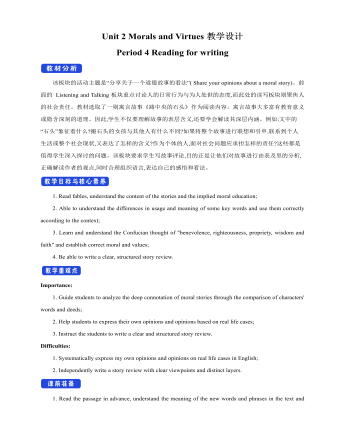
新人教版高中英语必修3Unit 2 Morals and Virtues教学设计四
3.Teachers ask different groups to report the answers to the questions and ask them to try different sentence patterns.The teacher added some sentence patterns for students to refer to when writing.Step 4 Writing taskActivity 51.Write the first draft.Students first review the evaluation criteria in activity 5, and then independently complete the draft according to the outline of activity 4, the answers to the questions listed in the group discussion and report, and the reference sentence pattern.2.Change partners.The teacher guides the students to evaluate their partner's composition according to the checklist of activity 5 and proposes Suggestions for modification.3.Finalize the draft.Based on the peer evaluation, students revise their own compositions and determine the final draft.Finally, through group recommendation, the teacher selects excellent compositions for projection display or reading aloud in class, and gives comments and Suggestions.Step 5 Showing writingActivity 5T call some Ss to share their writing.Step 6 Homework1. Read the passage in this section to better understand the passage.2. Carefully understand the hierarchical structure of the article, and deeply understand the plot of the story according to the causes, process and results;3. Independently complete the relevant exercises in the guide plan.1、通过本节内容学习,学生是否理解和掌握阅读文本中的新词汇的意义与用法;2、通过本节内容学习,学生能否通过人物言行的对比分析道德故事的深层内涵;3、通过本节内容学习,学生能否根据故事的起因、经过和结果来深入理解故事的情节,从而了解文章的层次结构;4、结合现实生活案例发表自己的见解和看法,写一篇观点明确、层次分明的故事评论。
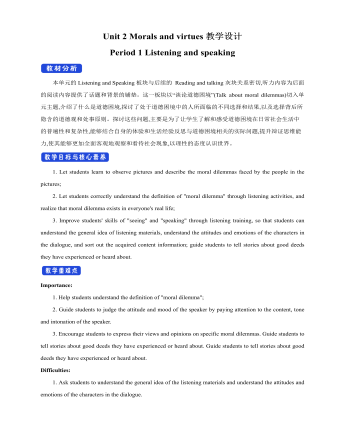
新人教版高中英语必修3Unit 2 Morals and virtues教学设计一
(2) students are divided into groups according to the requirements of activity 3. Each student shares a story of personal experience or hearing-witnessing kindness, and then selects the most touching story in the group and shares it with the whole class. Before the students share the story, the teacher can instruct them to use the words and sentence patterns in the box to express. For example, the words in the box can be classified:Time order: first of all, then, after that, later, finally logical relationship :so, however, although, butTeachers can also appropriately add some transitional language to enrich students' expression:Afterwards, afterwards, at last, in the end, eventuallySpatial order: next to, far from, on the left, in front ofOtherwise, nevertheless, as a result, therefore, furthermore, in addition, as well asSummary: in a word, in short, on the whole, to sum up, in briefStep 8 Homework1. Understand the definition of "moral dilemma" and establish a correct moral view;2. Accumulate vocabulary about attitudes and emotions in listening texts and use them to express your own views;3. Complete relevant exercises in the guide plan.1、通过本节内容学习,学生能否理解理解“道德困境”的定义;2、通过本节内容学习,学生能否通过说话人所表达的内容、说话的语气、语调等来判断其态度和情绪;3、通过本节内容学习,学生能否针对具体的道德困境发表自己的看法和见解,能否掌握听力理训练中的听力策略。
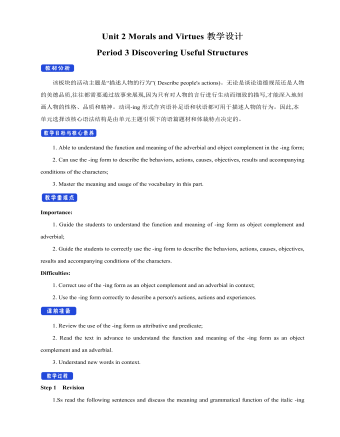
新人教版高中英语必修3Unit 2 Morals and Virtues教学设计三
The joke set her crying.这个玩笑使她哭起来。Step 5 ReadingActivity 31. Students read the small text in activity 3. The teacher provides several small questions to check whether students understand the content of the text and the ideographic function of the -ing form in the text.*Where are those people?*Why did Dr Bethune come to China?*How did he help the Chinese people during the war?*What did Chairman Mao Zedong say about him?2. Ss try to rewrite some sentences using the -ing form. Then check the answers. When checking the answers, the teacher can ask different students to read the rewritten sentences and give comments.Answers:1. he became very interested in medicine, deciding to become a doctor.2. …after hearing that many people were dying in the war.3. Helping to organise hospitals, he taught doctors and nurses, and showed people how to give first aid./ He helped to organise hospitals, teaching doctors and nurses, and showing people how to give first aid.4. …praising Dr Bethune as a hero to be remembered in China.Step 6 PracticeActivity 4Students complete grammar activities 2 and 3 on page 69 of the workbook.Step 6 Homework1. Understand and master the functions and usage of the -ing form;2. Finish the other exercises in Using structures.1、通过本节内容学习,学生是否理解和掌握动词-ing形式作宾语补足语语和状语语的功能和意义;2、通过本节内容学习,学生能否正确使用动词-ing形式描述人物的行为、动作及其经历;3、通过本节内容学习,学生能否独立完成练习册和导学案中的相关练习。
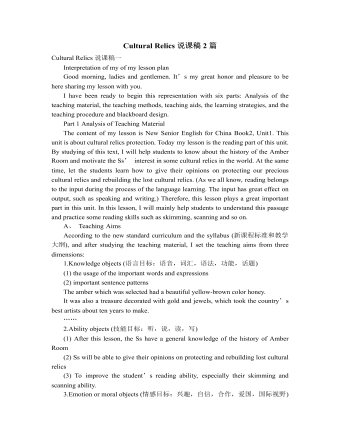
人教版高中英语必修2Cultural Relics说课稿2篇
Ⅲ. Analysis of the teaching material:The topic of this unit is cultural relics. Students are quite interested in topics about different cultures around the world. This is the second period of the whole unit. As a reading class, the passage mainly talks about the history of the amber room (how it was made, sent as a gift, lost and rebuilt).According to the new national curriculum, when teaching reading, much emphasis should be put on training the students’ reading skills.Ⅳ. Teaching objectives1. Language objectives:1) Students are required to master the key words and phrases occurred in the passage (e.g. amazing, decorate, belong, in return, less than etc.)2) Students are required to learn the attributive clause and acquire the sentence pattern.2. 1) Students are required to describe a certain thing by using the new sentence patterns.2) Students are required to master two kinds of reading skills—skimming and scanning, and learn to use them in their daily reading.3. 1) Students are required to know the history of the amber room.2) Students are required to appreciate cultural relics and understand the importance of protecting them.Ⅴ. Teaching important and difficult points1) the new words, phrases, and sentence pattern in the course of reading.2) Teaching difficult point: Help the students master two kinds of reading skills—skimmingand scanning and learn to apply them in daily use.Ⅵ. Teaching methods:Task-based method & Top-down model Ⅶ. Teaching aids: PPT, pictures, blackboard Ⅷ. Teaching procedure:
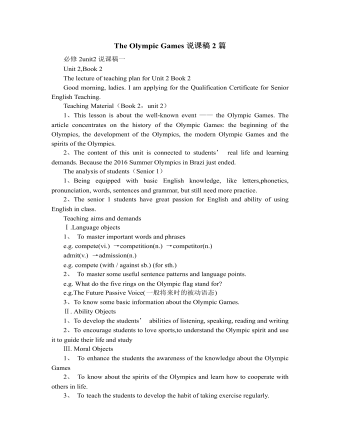
人教版高中英语必修2The Olympic Games说课稿2篇
Purpose of my design:To ask the students to do these two tasks will make the Ss predict the story of this passage. As a result, it will deepen Ss’ memory of this story because they will have their own understanding of this story.Step 3. While-readingTask 1. (Individual work _____min)Skimming: ask students to skim the text and the main ideas of each paragraph in this passage. Please read it quickly and then match the sentences with the letters.Task 2. (Individual work _____min)Scanning: read the text quickly and decide the whether the following statements are true or false and give reasons.Task 3. (Pair work _____min)Listen to the tape and fill in the banks. Then read the paragraph with expression to your partner.Task4 (individual work min)Listen to the tape again and write down the main idea in one sentence.Purpose of my design: Enable students to understand the given material better by using different reading skills. And proper competition can arouse the Ss’ interest in English learning. “Task-based” teaching method is used here todevelop the Ss’ ability of communication and also their ability of co-operation will be well trainedStep 4. Post-readingTask 1. (Individual work, pair work, group work, class work; _____min)Discussion (group of 4):1. If you were Hippomenes, would you run against Atlanta?2. Do you think Hippomenes deserved to win the race? Why or why not?Step 5. HomeworkPlease read the story again carefully after class and imagine: What will happen during the race between Hippomenes and Atlanta? Who do you think will win the race? Do you think Atlanta would marry Hippomenes? Write an end for the story with thses questions.Purpose of my design: Homework is so important and necessary for to master the knowledge they learned after class. It will check whether the Ss achieve the teaching aims.Part 5 Blackboard design
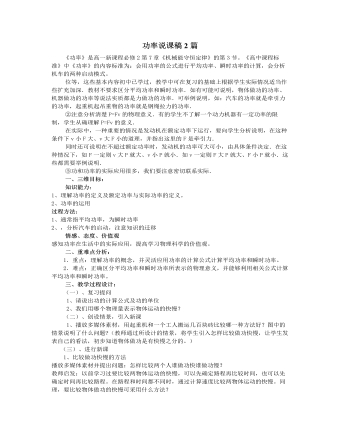
人教版新课标高中物理必修2功率说课稿2篇
(一)、复习提问1、请说出功的计算公式及功的单位2、我们用哪个物理量表示物体运动的快慢?(二)、创设情景,引入新课1、播放多媒体素材,用起重机和一个工人搬运几百块砖比较哪一种方法好?图中的情景说明了什么问题?(教师通过所设计的情景,将学生引入怎样比较做功快慢,让学生发表自己的看法,初步知道物体做功是有快慢之分的。)(三)、进行新课1、比较做功快慢的方法播放多媒体素材并提出问题:怎样比较两个人谁做功快谁做功慢?教师启发:以前学习过要比较两物体运动的快慢,可以先确定路程再比较时间,也可以先确定时间再比较路程。在路程和时间都不同时,通过计算速度比较两物体运动的快慢。同理,要比较物体做功的快慢可采用什么方法?
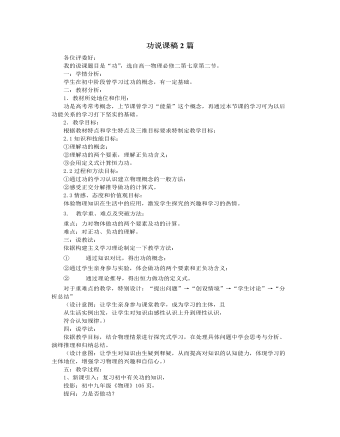
人教版新课标高中物理必修2功说课稿2篇
探究一:高中阶段功的含义是什么?投影:初中九年级《物理》105页学生思考:①图中物体的势能、动能分别如何变化?②物体能量的变化和做功是否存在关系?学生:分组讨论,得出结论:如果物体的能量发生变化时,说明有力对物体做了功。教师:进行点评和小结(设计意图:对初中知识深化理论认识,并为以后功能关系的教学作准备)探究二:力对物体做功的两个要素是什么?情景再现:找体重相对悬殊的两位同学,①A同学试图抱起B同学,但没成功。②B同学抱起A同学在教室内匀速走动。学生思考:在①中,A是否对B做功?在②中,B是否对A做功?学生:分析得出做功的两要素:物体受到力的作用,并且在力的方向上发生位移.教师:让学生分别例举生活中力对物体做功和不做功的例子,(设计意图:让学生亲身参与课堂实验,烘托课堂气氛,相互协作增进同学情谊)探究三:如果物体的位移不再力的方向上,那么力是否还对物体做功?

人教版高中生物必修2伴性遗传说课稿
(1观察图解,色盲基因在性别间是如何传递的呢?(女--女、女--男、男--女)(2)为什么不能由男性传给男性?(色盲基因是在X染色体上,因此色盲基因是随X染色体的传递而传递。)(3)男性的色盲基因怎样才能传给男性呢?(通过女儿,传给外孙即交叉遗传)(4)从图解看色盲在男女中的发病情况怎样?(男性多于女性)(5)从社会调查也是这样,你是否能从基因和染色体的角度加以解释?(提示:女性染色体的构成,结合基因位置及显隐性进行分析)归纳特点:归纳出色盲基因遗传的特点并扩展到X染色体隐性遗传的特点上。色盲基因遗传(X隐性遗传)的特点:(1)男患者多于女患者(2)交叉遗传(3)女病儿子必病,男正女儿必正等。问题探讨:利用“遗传图解”结合“问题链”继续探讨,拓展到抗维生素D即X 染色体显性遗传的特点。(6)色盲基因在X染色体上属隐性基因,子代表现男多于女,对应的正常色觉基因则属于X显性基因,子代表现应如何?(女多于男)
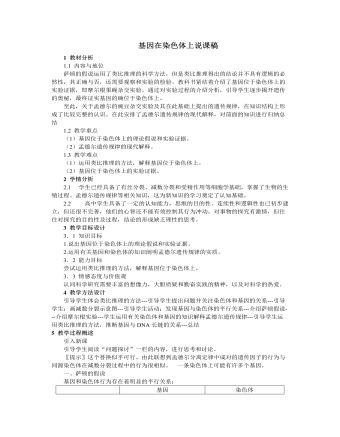
人教版高中生物必修2基因在染色体上说课稿
三、孟德尔遗传规律的现代解释①分离定律:在杂合体的细胞中,位于一对同源染色体上的等位基因,具有一定的独立性;在减数分裂形成配子的过程中,等位基因随同源染色体的分开而分离,独立地随配子遗传给后代。②自由组合定律:位于非同源染色体上的非等位基因的分离或组合是互不干扰的;在减数分裂过程中,同源染色体的等位基因彼此分离的同时,非同源染色体上的非等位基因自由组合。总结:再次强调孟德尔遗传定律的现代解释课堂练习:书本31页6、教学反思:本节课设置了一系列问题情境,层层设问,在学生答问、质疑、讨论过程中让学生建构新概念和新的知识体系,并通过教师及时掌握反馈信息,适时点拨、调节,让学生在推理判断中培养良好的思维习惯和对知识的迁移能力,而且通过留出一定的时间让学生提问,体现了以学生为主体的思想。